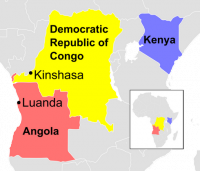-
Water pollution across three continents poses health risks to hundreds of millions
Water pollution has risen across three continents, placing hundreds of millions of people at risk of contracting life-threatening diseases like cholera and typhoid. Pathogen and organic pollution rise in more than 50 percent of river stretches in Africa, Asia, and Latin America. Asia hit hardest by rise in severe pathogen pollution, with up to a half of all river stretches affected. Up to 323 million people on three continents at risk of infection from diseases caused by pathogens in water.
-
-
Florida teen only the 4th U.S. survivor of brain-eating amoeba claiming 97 percent mortality rate
A 16-year-old South Florida boy has defied the odds by becoming only the fourth U.S. patient to survive an attack by brain-eating amoeba.Naegleria fowleri is a microscopic amoeba commonly found in warm freshwater lakes, rivers, and streams. If the amoeba enters the body through the nose, it typically makes it way to the brain, causing an extremely rare and destructive infection of the brain. In the past fifty years, only four people in the United States have been reported to have survived out of the 138 cases reported, giving it almost a 97 percent mortality rate.
-
-
Robot, drones to help collect crop testing data to bolster agricultural production
A rumbling robot and several high-flying drones recently made an on-site appearance at Clemson University to burrow through and buzz above fifteen acres of experimental sorghum plots containing more than 2,800 replicated entries. The space-age devices are part of a collaborative project with Clemson University and other partners designed to significantly enhance the ease and frequency of data collection for crop testing in ways that will eventually benefit all agricultural production in South Carolina and around the world.
-
-
Syria faces food crisis as wheat shortage deepens
Syria’s ongoing wheat harvest is not large enough to feed people living in areas controlled by the government, researchers have warned. Syrian farmers sold 450,000 tons of wheat last year — less than half the quantity needed to supply government-controlled areas of the country with enough bread. In total, the country will need around one millions tons of wheat to avoid a hunger crisis. Before the war, Syria used to produce five million tons of wheat pear year. Out of these, two million tons were consumed in the country while the rest was either sold as exports or stored in a stockpile. This stock was aimed at meeting Syria’s food needs for five years but is now nearly depleted.
-
-
Data sharing should become routine for best response to public health emergencies
The recent outbreaks caused by Ebola and Zika viruses have highlighted the importance of medical and public health research in accelerating outbreak control and have prompted calls for researchers to share data rapidly and widely during public health emergencies. However, the routine practice of data sharing in scientific research, rather than reactive data sharing, will be needed to effectively prepare for future public health emergencies.
-
-
“Zombie drug” flakka causes “excited delirium,” but probably not cannibalism: Experts
It was a gruesome sight: Florida police pulled a 19-year-old Florida State University student away from the bodies of his two victims, only to find that the one of them was severely bitten in the face. Police officers say the immediately knew who (or, rather, what) the culprit was: flakka, or bath salts, a powerful man-made drug. Experts say that “bath salts” drugs can cause “excited delirium,” but probably do not drive users to cannibalism.
-
-
Yellow Fever outbreak on verge of going global, with vaccine supply running short

The largest Yellow Fever epidemic for decades is now sweeping the Democratic Republic of Congo and Angola and could soon spread to the Americas, Asia, and Europe. The outbreak has all but emptied global emergency stocks of vaccine. There are only seven million emergency vaccines available for the current vaccination campaign — too few to even fully cover the city of Kinshasa, let alone the whole of the DRC.
-
-
Climate change to increase health risks from wildfires in U.S. West
A surge in major wildfire events in the western United States as a consequence of climate change will expose tens of millions of Americans to high levels of air pollution in the coming decades. The researchers estimated air pollution from past and projected future wildfires in 561 western counties, and found that by mid-century more than eighty-two million people will experience “smoke waves,” or consecutive days with high air pollution related to fires.
-
-
Assessing crop damage after extreme weather
The Philippines is host to six to nine tropical cyclones per year since 1970, and a citizenry that consumes more rice than it produces. The Philippines has for many years augmented its homegrown supply of rice with imports based on seasonal climate forecasts and agricultural production surveys. But import orders must be modified on the fly when extreme weather events exact a heavier toll on production than expected. New method to track the impact of typhoons and other natural disasters could enable more precise, timely delivery of food aid.
-
-
Six million Americans drink water with unsafe levels of toxic chemicals
Levels of a widely used class of industrial chemicals linked with cancer and other health problems exceed federally recommended safety levels in public drinking water supplies for six million people in the United States, according to a new study.
-
-
Food crisis in northeast Nigeria drives youth to radicalize, join Boko Haram: UN
Urgent action is needed to provide farming and livelihood support to 385,000 people in parts of Nigeria’s northeast where food insecurity is rampant, the UN Food and Agriculture Organization (FAO) said. The UN agency noted that more than three million people are affected by acute food insecurity in Borno, Yobe, and Adamawa States. Failure to rebuild the rural economy will translate into lack of employment opportunities with possible harmful consequences including youth radicalization and enrolment into armed groups, resulting in continued civil unrest.
-
-
Brazil’s sewage woes reflect the growing global water quality crisis

All eyes are turned toward Rio de Janeiro to watch top athletes compete, yet the headlines continue to highlight the problems with the water quality and the risks to the athletes who swim, row, and sail, and even to tourists simply visiting the beaches. But Brazil’s wastewater woes are hardly unique. The water quality of lakes, rivers, and coastal shorelines around the world is degrading at an alarming rate. In fact, pollution of the ten largest rivers on earth is so significant that it affects five billion people. While the spotlight is shining on the athletes over the next few weeks, let us also shine a spotlight on what we can do to improve and restore water quality around the world through our collective efforts, use of new tools, and risk frameworks, moving the political will one step closer toward sewage treatment and protection of the biohealth of the blue planet.
-
-
$2.3 million grant for Ebola vaccine research
The Center of Excellence for Emerging Zoonotic and Animal Diseases, or CEEZAD, at Kansas State University will use a $2.3 million federal grant to study the safety in livestock of a newly developed vaccine to protect humans from the Ebola Zaire virus. No infectious Ebola virus will be used in the Biosecurity Research Institute during the studies.
-
-
Researchers projecting epidemic’s spread say Zika cases are under-reported

With the report from Florida governor Rick Scott on Monday that fourteen people in the state have been infected with the Zika virus most likely through mosquito transmission, the concern about outbreaks in the United States has intensified. A new study, along with interactive maps, provides current numbers as well projections for the number of Zika cases in the Americas through January 2017. It also provides projections for the number of microcephaly cases associated with the disease through October 2017, a date chosen to allow for the nine months of pregnancy.
-
-
In Zika, echoes of U.S. rubella outbreak of 1964-65

Just over fifty years ago, a highly contagious but seemingly harmless virus swept through the United States, infecting as many as 12.5 million people. In both adults and children, the virus presented as a mild illness, but caused birth defects in some babies born to women who were infected while pregnant. Does this sound familiar? Though separated by time and place, there are surprising similarities in the social issues raised by the rubella outbreak of 1964-65 and the recent Zika outbreak in South America. Both viruses can cause birth defects, a fact that ties them to social issues surrounding pregnancy, women’s health, and the politics of abortion.
-
More headlines
The long view
We Ran the C.D.C.: Kennedy Is Endangering Every American’s Health
Nine former leaders of the Centers for Disease Control and Prevention (CDC), who served as directors or acting directors under Republican and Democratic administrations, serving under presidents from Jimmy Carter to Donald Trrump, argue that HHS Secretary Roert F. Kennedy Jr. poses a clear and present danger to the health of Americans. He has placed anti-vaxxers and conspiracy theorists at top HHS positions, and he appears to be guided by a hostility to science and a belief in bizarre, unscientific approaches to public health.
